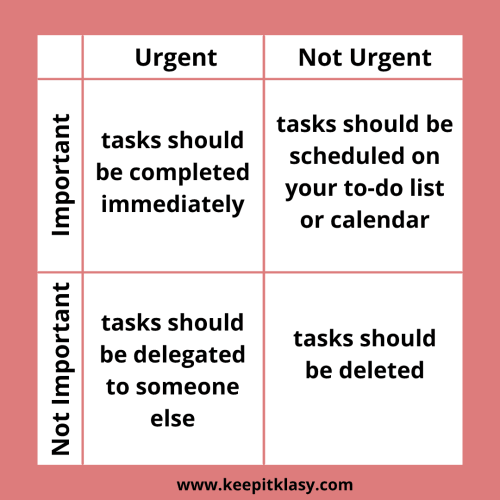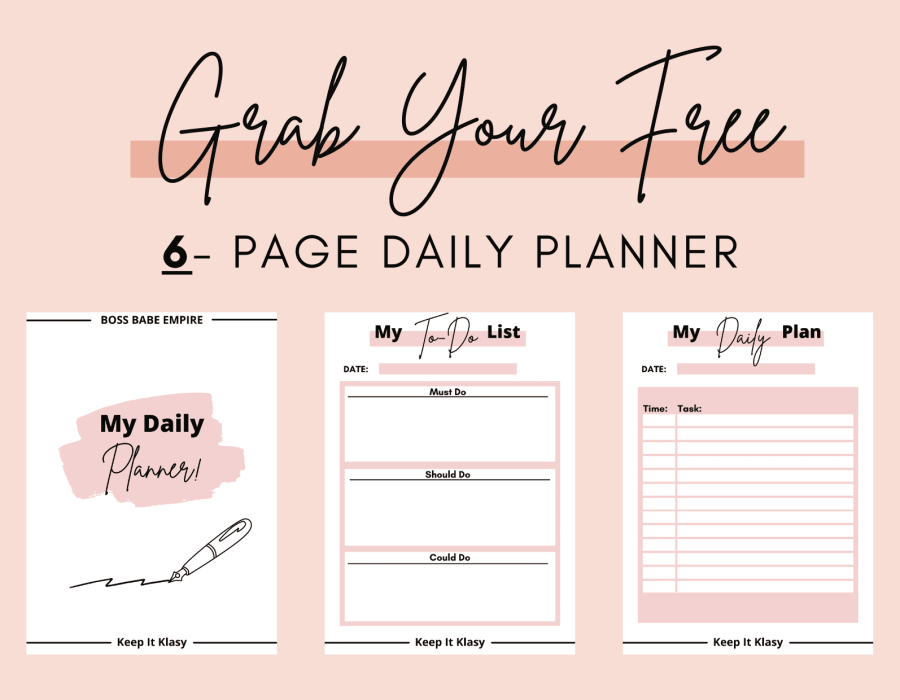
Isn’t it so satisfying to be able to tick things off from your to-do list? I love that feeling of accomplishment that comes with it. You can literally feel the feel-good hormones running through your body. If you are reading this post you are probably on a journey towards specific goals and dreams and would like to know more about how to plan your day effectively like a pro so you can reach them. Wanting to improve is the first step so you’re already that bit closer to achieving it all.
Disclaimer: This site contains affiliate links to products. We may receive a commission for purchases made through these links. Visit my disclaimer page for more information.
Planning is a skill!
Believe it or not, planning is a skill in itself. This is good news because it means it can be learned and it is something you can improve on. That is if you are willing to learn more about it and implement the right habits and tools. Since you are here, it already tells me you are.
Well, if this is your aim, if you want to improve your planning skills so that you can achieve all your tasks and get closer to your goals, you’re in the right place! I’ve got you covered with these amazing and evidence-backed tips on how to plan your day effectively and become an unstoppable Boss Babe planning pro!
I hope these tips will inspire you and provide you with the right framework. The rest is up to you!
So how to plan your day effectively like a pro?

Make the plan the night before
Planning takes time so plan to plan.
I recommend doing this the day/night before and turning this into your habit.
You want to wake up and be ready to execute the plan you’ve made. This way you are starting the day on the right foot, ready for productivity. Mornings are busy and you do not want to be getting distracted by tasks that will make it difficult for you to even make the plan. And no plan is a definite productivity killer. Therefore, plan your day the evening before.
In addition, planning the night before helps you to get all the tasks out of your mind. How often have you found yourself unable to get to sleep because your mind is flooded with what you need to do the next day? Get it down on paper (or google calendar) and you can forget about it till the morning.
Brain Dump
The first step to planning is to do a brain dump. Literally, grab a piece of paper or use the brain dump page from your free planner to get all tasks out. It does not have to be organised. Sometimes writing certain tasks will trigger your mind to think of something else you need to do. If you do not brain dump first, your to-do list will start looking very messy and disorganised.
A brain dump does not need to be neat and pretty. You just want to have one place where you can see all you need to do so that you can put it into some logical order.
And the more organised your to-do list is at the end, the more likely you’ll stick to it.
Break up tasks into small chunk
When you look at your brain dump, there are probably some big projects on there. For example, writing an essay, replying to all emails, batch cooking. These are huge overwhelming tasks. In addition, if you have lots to do that day, it may not be possible to finish the whole task in one day. Break it up into manageable chunks. It helps you to get a more realistic idea of how long the tasks might take and help you assign the right amount to them. Plus, breaking up these big tasks into smaller chunks can keep you more focused and productive at executing them.
For example, with the essay you could plan to:
- Write 500 words in 1 hour
- Spend 2 hours researching one paragraph
- 1 hour writing the reference list
With the emails, you could plan to spend:
- 30 mins to reply to James, Amy, and John, etc.
These are just examples, but this method is very effective and can help to keep you on track with your schedule.
Set the right priorities
You will most likely overestimate how much you can do in a day. This is very common and is described by the concept called Planning Fallacy. Planning Fallacy states that humans tend to be over-optimistic in making time estimations. So do not get disheartened, it’s just human nature.
However, there will certainly be tasks in your schedule that you most definitely need to do and cannot leave till the next day. On the other hand, there might be tasks that are not urgent, and you could put them off.
Rather than putting your tasks into categories, such as work, home… instead try splitting the tasks into the following three to-do lists.
- Must do: urgent and must be done today
- Should do: semi-urgent but could be left till tomorrow.
- Could do: non-urgent and can be done sometime this week. Only do these tasks if you have completed the tasks from the must-do and should-do column.
To guide you in priorities you can also use the Eisenhower Matrix:

Write tasks down in the order you’ll do them
Write down the tasks in the order that you will do them and try to schedule the most boring or work-intensive tasks first – basically anything you think you will procrastinate on. The things you dread doing the most often lead to procrastinations <<< MAJOR PRODUCTIVITY KILLER.
Get them out of the way as quickly as possible so you can focus on all other important tasks. And try to reward yourself for getting them done. If you finish the task maybe you can grab yourself a Starbucks? ; )
Use the time blocking technique
Also known as timeboxing. This is the tactic used by people like Elon Musk and Bill Gates. Both are the ultimate powerhouses of success and I bet a lot of this is due to their organisation skills.
Time blocking simply means assigning a FIXED amount of time to a task. You are essentially putting a limit on how much you can spend on the task. This will increase your focus and productivity and you won’t be wasting time.
The tactic is useful because it counteracts Parkinson’s law.
Parkinson’s Law states that: work expands to fill the time allocated for it.
If you assign 2 hours to a task, you will spend 2 hours on it. If you assign yourself 1.5 hours, you’ll probably get it done in 1.5 hours.
Therefore, time block every one of your tasks as part of the planning strategy.
Be realistic about your goals
Be realistic! If you are not honest with yourself about how much time a task will take you are setting your plan up for failure. This goes back to the concept of Planning Fallacy mentioned earlier. So do not fall for this trap. Remember that it is better to over-estimate your time than under-estimate it. Use your experience because you know how much time certain tasks will take you.
Assigning the right amount of time to a task is a skill so do not get disheartened if you do not get it right the first time. With time and experience, this will be easier, and your estimation will become more accurate.
To help you with accurate estimation you could time how long tasks take you. This will help you in the future when you do the task again.
Delegate tasks
Can someone else do or help with the tasks?
Batch things together
There will certainly be tasks that you can group together and do at the same time. For example, going for a run and stopping by the supermarket at the end to pick up a few things you need. Have you got a birthday coming up? Buy 5 different birthday cards for all the birthdays coming up in the next few months. Maybe buy some wrapping paper too. Think ahead of time and plan ahead of time. Once you switch on the mode of being a few steps ahead and batching things together, you will save a ton of time long-term.
Schedule in things you enjoy
If you have a busy schedule, you will need some winddown time too. Schedule some time to relax after your busy day to recharge. Having something to look forward to can act as an incentive to complete the tasks so you can reward yourself at the end of the day.
Find the right tools that work for you
Some of my favourite and tested tools are listed below.
#1 Google Calendar
It is an awesome tool if you like to have your, planner, on your phone and wherever you go. I love the feature that allows you to colour code various types of tasks.
#2 Physical Calendar
I am definitely old school and I much more prefer to use a printed calendar over a digital calendar. Although, it takes up space and can be a hassle to carry around I just like the process of organising my tasks and writing them down, and making them look pretty ; ). Here is the planner I have been using for years and I love it! If you do not want to spend money, I created a simple printable one for you. Check it out below.
Planner
Cannot live without this planner and it has helped me stay on track with planning my day, week, month to get everything done.

Make regular planning a habit
Like anything, you will only get better at planning with experience. Do not wait for motivation, because motivation is not reliable. Discipline and habit building are key.
9 Biggest mistakes to avoid when planning your day!
So far, we have discussed the effective ways to plan your day. Awesome! However, you also want to avoid the common mistakes that can be made that can set you back when you are working through your to-do lists. Here are 9 of the most common ones you’ll want to keep in mind.
#1 Not tracking time
You need a clear idea of how long a task will take you. Once you know how much time you will need, keep yourself accountable by tracking the time. Especially if you have multiple tasks and projects to work on that day. Keeping your eye on the time can help you stay more focused on the task too. It will also help you learn how long a particular task takes so you can better assign time to it in the future.
#2 Not eliminating distractions
In order to carry out the tasks on your to-do lists with success and in the time you have assigned to them, you want to try and eliminate any distractions.
#3 Choosing the wrong environment to do the tasks
Try to find a quiet place and politely let people know that you will not be available for that amount of time. Make sure the environment itself is not distracting. I am definitely one of those people that gets distracted if my environment is messy. For me a messy space = messy head. I always need to tidy up before I can get on with my task and give it my 100%. If you can relate, I truly recommend just spending that 10 mins cleaning up your space.
#4 Not readjusting plan
Plans are amazing but at times unpredictable things will come up and divert your attention. You have little control over it. Have the plan in place but leave some room to make readjustments as you go along. If you get too sucked into the initial plan, if anything changes, you’ll just end up getting stressed. And this is counterproductive in itself.
#5 Not scheduling in breaks
Breaks are necessary and you should incorporate them into the plan as much as the task that needs completing. You need rest. It is not a waste of time, if anything it will drive your productivity as you’ll let your mind reset. Trust me you’ll be more productive if you have a bit of time to relax. This is why the Pomodoro technique is so great.

#6 Not reflecting
Reflect on your progress. Reflection will help you in the future to make more effective plans. In addition, it will help you appreciate how much you have achieved. You’ll identify what went well, what works for you, and what you might need to improve on when planning and executing your tasks. In the long run, it will give you motivation and wisdom and make you better at managing your time.
#7 Not evaluating your progress
When you reflect you typically analyse with retrospect, but it is also important to evaluate your process as you go along. Celebrate the small wins during the day and cheer yourself on as you tick off things on your to-do list. Similarly, evaluate if a particular technique is working for you or not. If not, then do not be afraid to make a change.
#8 Putting things off when tasks are overwhelming
Why do you procrastinate?
Procrastination will kill your productivity and with it, you GOALS! Unlike what many people believe, procrastination is not the same as laziness. People typically procrastinate to avoid the negative feelings associated with a particular task. If the task is big, if it makes you anxious, if you feel overwhelmed or not in the right mindset – all these things can lead you to procrastinate. It does not in any way mean you are lazy, it’s just your mind protecting you from uncomfortable feelings.
How to overcome procrastination?
Identifying the real reason behind procrastination will help you overcome it. You know that you do have what it takes to do the task, but you just need to check in with your feelings. Maybe you can split the task up even further into more manageable chunks. Maybe you can promise yourself a reward if you complete the task. Whatever it is, shift your focus to dealing with the feelings rather than the execution of the task. Once you overcome your negative feelings, starting the task will become easier.
#9 Not having clear long-term goals
For you to find the motivation or feel a sense of discipline to complete a task you need to have a goal in mind. If you have a set long-term goal, it means you have thought about the benefits that achieving that goal will bring. Embase this when making your plan. Think about what it would mean for you to reach that goal or that milestone. I bet, whatever it is, it would feel great to get there.
On A Final Note.
Let me know in the comments below what you think of these tips and if you implemented them into your day. Most importantly let me know if they helped you plan your day more effectively and helped you achieve your goals? If you have any other suggestions you would like to share, we’d all love to hear your ideas : ).
Natasza
xxx


